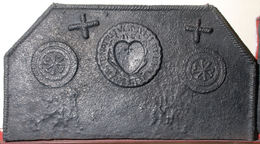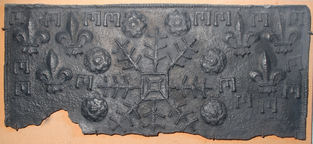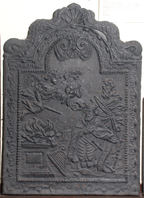-
372
Description: Rectangular with canted top corners; twisted rope edging all round except on bottom; three impressions of two circular wafering irons: the central one with invected edge, a heart surmounted by a cross beneath which scroll-work is arranged symmetrically, inscription around edge; the two outer stamps comprise a central motif of four hearts arranged in a cross shape, their points facing the centre, within two concentric bands decorated with lace-like patterns. Above each of the two outer stamps is a simple four-pointed cross shape formed from short lengths of twisted rope.
Notes: The use of wafering irons or butter prints as stamps in casting firebacks is infrequent. Formerly part of the J. H. Every collection.
Inscription: ...N:YOU:NOT: REIVE:MY:HERT:IS:YOURES / [?]1562
- Decoration tags:
- rectangular with canted top corners (shape)
- rope (edging)
- simple stamps
- apotropaic
- text
- objects
Manufactured: in 1562 in the Weald area of England.
Current location: Anne of Cleves House, Southover High Street, Lewes, East Sussex, England.
Museum number: 1944.24.048 (part of the Sussex Archaeological Society museum group)
Citation: Hughes, G. B., 1960, Collecting Antiques (London, Country Life), pp. 85-93.
Citation: Hughes, G. B., 21 Apr 1955, 'Old English Firebacks', Country Life, 117, pp. 1056-60.
Citation: Hughes, G. B., May 1940, 'Old English Firebacks', Apollo, 31, 185, pp. 117-120.
- Attached to series:
- Food mould stamp firebacks
- Heart cross stamp series
-
375
Description: Rectangular; twisted rope edging (top and sides); central rope carbuncle with eight arms, with a rose between each of the top six pairs of arms; a fleur-de-lys repeated six times in two triads (2-1) in each top corner; a letter ‘E’ rotated clockwise repeated 8 times along the top between the fleurs and roses, and twice down each side; four additional ‘E’s, one to the left of the carbuncle and three to the right.
Notes: All the stamps can be seen on other firebacks associating them with the same source; The ‘E’s are identical to those seen on the John Harvo armorial fireback. The elaborate central rope array may be an interpretation of the escarbuncle, which was the principal heraldic charge on the arms of the Duchy of Cleves, possibly associating this fireback with the brief marriage of Henry VIII and Anne of Cleves. Formerly part of the J. H. Every collection.
- Decoration tags:
- rectangular (shape)
- rope (edging)
- simple stamps
- carved stamps
- heraldic
- text
- objects
Manufactured: in the mid- to late-16th century possibly at Pounsley Furnace, Framfield in the Weald area of England.
Current location: Anne of Cleves House, Southover High Street, Lewes, East Sussex, England.
Museum number: 1944.24.076 (part of the Sussex Archaeological Society museum group)
Citation: Hughes, G. B., 1960, Collecting Antiques (London, Country Life), pp. 85-93.
Citation: Hughes, G. B., May 1940, 'Old English Firebacks', Apollo, 31, 185, pp. 117-120.
- Attached to series:
- Pounsley series
- Fleur-de-lys firebacks
-
424
Description: Arched rectangular central panel with bead edging terminating at the top in two loops, gather drapery and a scallop shell; two figures to the right, both bearded, the one kneeling wears cavalry armour, a cloak and a crown, the other stands behind; to the left is a sacrificial pyre on which an ox carcass burns, and above an angel carrying a sword in his right hand and a skull in his left; around this is an arched rectangular border with fillet edging and a repeated leaf pattern; on top is a scallop shell between two dolphins.
Notes: The scene illustrates the visitation of the pestilence on Israel described in 2 Samuel 24, and the sacrifice of an oxen by King David; the skull borne by the angel represents the death of those struck down by the plague. A slightly different version has the face of David looking down (no. 527). Formerly part of the J. H. Every collection.
Copies of this fireback are known.
Manufactured: in the mid- to late-17th century in the Siegerland area of Germany.
Current location: Anne of Cleves House, Southover High Street, Lewes, East Sussex, England.
Museum number: 1944.24.070 (part of the Sussex Archaeological Society museum group)
Citation: Hughes, G. B., 1960, Collecting Antiques (London, Country Life), pp. 85-93.
-
930
Description: Carved wooden fireback pattern. Arched rectangular central panel with cavetto-canted shoulders and bead edging on a broad fillet; seated female figure in a chariot drawn by armadillos, symmetrical hanging drapery above right; same-shaped border with fillet edging at top, and suspended ribbons with floral bunches; at base, symmetrical palm leaves tied with ribbon; symmetrical serpents on top their tails intertwined.
Notes: The design is derived from a personification of America, on one of a set of playing cards entitled Jeu de la Géographie, designed by Stefano della Bella (1677); reputedly from Mayfield; presented to Brighton Museum by Henry Willetts. A casting from this pattern is no. 215.
- Decoration tags:
- 'Dutch' (shape)
- whole carved pattern
- planklines
- pictorial
- allegorical
- animals
- humans
- objects
Manufactured: in the late-17th to early-18th century in England.
Current location: Rottingdean Grange, Rottingdean, East Sussex, England.
Museum number: R3341/7 (part of the Brighton Museum museum group)
Citation: Dawson, C., 1903, 'Sussex Iron Work and Pottery', Sussex Archaeological Collections, 46, pp. 1-54.
Citation: Hughes, G. B., 1960, Collecting Antiques (London, Country Life), pp. 85-93.
Citation: Hughes, G. B., 21 Apr 1955, 'Old English Firebacks', Country Life, 117, pp. 1056-60.
- Attached to series:
- Patterns
- Mayfield 'Dutch' series



.jpg)